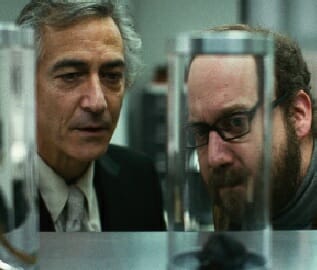
Release Date: Aug. 7 (limited)
Writer/Director: Sophie Barthes
Starring: Paul Giamatti, Dina Korzun, David Strathairn, Emily Watson
Cinematographer: Andrij Parekh
Studio/Run Time: Samuel Goldwyn Films, 97 mins.
A little bit of soul: Chilly, absurd comedy-drama showcases Paul Giamatti as himself
In Cold Souls, Paul Giamatti plays Paul Giamatti, well-known New York actor of screen and stage who’s in rehearsals for the lead role in Chekov play Uncle Vanya. Whether it’s the weight of starring in a Russian classic or the more generalized lethargy of middle age, Giamatti seems lately to feel the burden of his soul.
But an article in The New Yorker has the answer: a company run by Dr. Flintstein (David Strathairn) can extract and store a person’s soul indefinitely, for a modest fee. They’re even listed in the Yellow Pages. How convenient.
Cold Souls begins as a drab, satirical high-concept movie along the lines of Being John Malkovich, but it becomes a more serious and distant film, both more thought provoking and more difficult to enjoy. Its first half is frequently clever and witty, especially when it draws on Giamatti’s exasperated, “I’m not drinking any fucking Merlot!” persona that we know and love, and even more when it puts him against calmer men like Strathairn. “My soul is a chickpea?” Giamatti says, baring his teeth, when he sees his essence at the bottom of an oversized jar.
The real Giamatti is brilliant when his fictional, newly soulless self shows up at rehearsal and tries to play Vanya as a stylistic blend of William Shatner and Benny Hill. The actor turns intense after he rents the soul of a Russian poet—another service that Flintstein offers—and gives the rehearsal another go. These early moments are so fun and well executed that they leave you with high hopes for the remainder, but they turn out to be the movie’s best scenes.
One of the most intriguing aspects of Cold Souls, though, is writer/director Sophie Barthes’ decision to make the loss of a soul a clinical, observable event. Her struggling artists face the temptation of unloading their deepest burdens, but quickly learn that good art requires not only soul but struggle. In Barthes’ film, frivolous Americans are supported by the sacrifice of those in distant lands where the impoverished—in their effort to survive—often trade the very essence of their being for cash. This becomes a metaphor for actors who risk losing their identity while spending their lives inhabiting fictional characters for fame and profit. Like the “mules” who help traffic souls on the black market, in Cold Souls these actors run the risk of accumulating too many “soul fragments.”
Unfortunately, each of these fertile ideas gets only a few shallow iterations before Barthes loses interest and moves on to the next. Once Giamatti tries to perform without his essence we realize how preposterous that would be, but then he continues to spend large portions of the film seemingly without a soul, behaving normally, as if he has adapted to his inner vacuum. When he goes off to Eastern Europe to locate the true owner of his briefly rented soul, Cold Souls feels like another film entirely, as if Barthes had a dozen ideas for short films, and instead of expanding any one of them into a feature, she used them all. I’m hesitant to complain about too many ideas, but ideally they’d build on each other to create a harmonious whole or a delirious hall of mirrors. Instead, they’re lined up gracelessly, end-to-end.
Giamatti gives one of his best performances, but even with the film’s occasional humor, Cold Souls remains chilly and scattered. For all of its virtues, it offers neither solid, sustained entertainment nor deep insight.